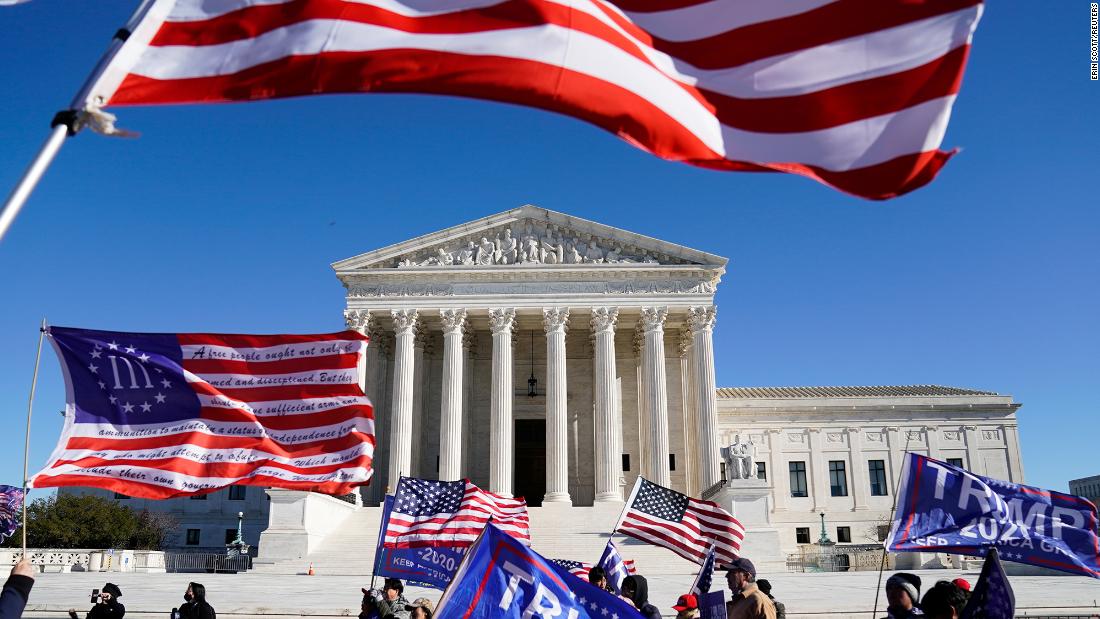
Paxton, who has been indicted on securities fraud and accused by top aides of bribery, abuse of office and other potentially criminal offenses -- charges that he has denied -- argued that a handful of battleground states destroyed the integrity of the 2020 election vote totals. He insists the US Constitution was violated by allowing their legislatures to make last-minute changes that ignored federal electoral regulations.
Earlier in the campaign, Paxton played a key role in President Donald Trump's fight against expanding mail-in ballots. Now Paxton's plea to the Court is that Michigan, Wisconsin, Pennsylvania and Georgia must be found to have used the Covid-19 pandemic as an excuse to manipulate outcomes.
If that argument has merit, he ought to have included his home state in the lawsuit.
Texas' Republican Gov. Gregg Abbott extended early voting by a week and expanded the period in which mail-in ballots could be hand-delivered. "Using his emergency authority because of the pandemic," Glenn Smith, a Texas Democratic political consultant, told me, "our governor accomplished exactly what his attorney general is saying other states did, improperly. Nonsense. None of this harmed the presidential election. It helped turnout."
But apparently, to Paxton, it's only legal if the rule changes help the GOP win.
To make his case, the Texas AG marches out the same unproven allegations numerous courts have already found specious. His paranoia includes hidden suitcases full of ballots, a secret laptop and several USB drives supposedly used to program favorable Democratic results in Pennsylvania, and even alleged videos of poll workers cheering as poll watchers are ordered out of counting rooms. Credible evidence of such allegations has never been produced, and the US Supreme Court rejected another GOP bid to block certification of the Pennsylvania result on the same day that Paxton filed his suit.
There is, meanwhile, an accumulating body of allegations against Paxton. A letter obtained in October by the Austin American-Statesman and television station KVUE, noted that a number of Paxton's top aides had reported to "the appropriate law enforcement authority" a "potential violation of law" by Paxton. The staffers insisted they had "a good faith belief that the Attorney General is violating federal and/or state law, including prohibitions relating to improper influence, abuse of office, bribery and other potential criminal offenses."
Several of Paxton's former employees filed a whistleblower lawsuit against the attorney general, saying Paxton retaliated against them after they accused him of intervening in legal matters to help his friend, a real estate investor who had made a $25,000 donation to his 2018 campaign, according to the suit. Paxton has denied their allegations.
The investor named by the lawsuit, Nate Paul, said he had also employed a woman based upon a recommendation by Paxton. Although Paul said he was not doing favors for the attorney general, the Texas Tribune and The Dallas Morning News have reported at least two people say Paxton told them he had an extramarital affair with the woman Paul later hired. Paxton insists the allegations are all part of a "political witch hunt" and denies any wrongdoing.
Paxton has already been indicted for felony securities fraud, accused of failing to register with the State Securities Board while selling stock to investors without disclosing he was making a commission. The case has been hung up on questions of venue, and payment and replacement of county prosecutors, and has slogged through appeals that have dragged it out for five years without adjudication.
The indictments did not stop Paxton from winning reelection at the same time his wife was being voted into a seat in the Texas state senate. In one of her earliest acts in public office, Angela Paxton filed a bill to broadly increase her husband's power with legislation allowing him to exempt individuals from state securities law. Surely, it is only coincidental that those are the laws Paxton is accused of violating. The measure appears to have stunk too much even for the Texas legislature and didn't get a committee hearing.
The Texas AG's latest US Supreme Court plea might just be currying favor with Trump in an attempt to get a pardon before Paxton is potentially tried and convicted. Even a bad lawyer like our attorney general is likely to know he has no real case. The electoral fraud argument is considerably weaker than the pleadings his office made to ask the high court to overturn the Obama administration's Affordable Care Act, which it denied.
It's hard to believe the Supreme Court will bother to hear Paxton's case, which has the potential to disenfranchise tens of millions of voters, especially after its Tuesday ruling on Pennsylvania. But at one point it also seemed improbable that the narcissistic host of a reality TV television show could become the President of the United States.
"case" - Google News
December 09, 2020 at 11:30AM
https://ift.tt/3grmPtj
The rank hypocrisy of the Texas AG's election case - CNN
"case" - Google News
https://ift.tt/37dicO5
Shoes Man Tutorial
Pos News Update
Meme Update
Korean Entertainment News
Japan News Update
Bagikan Berita Ini














0 Response to "The rank hypocrisy of the Texas AG's election case - CNN"
Post a Comment